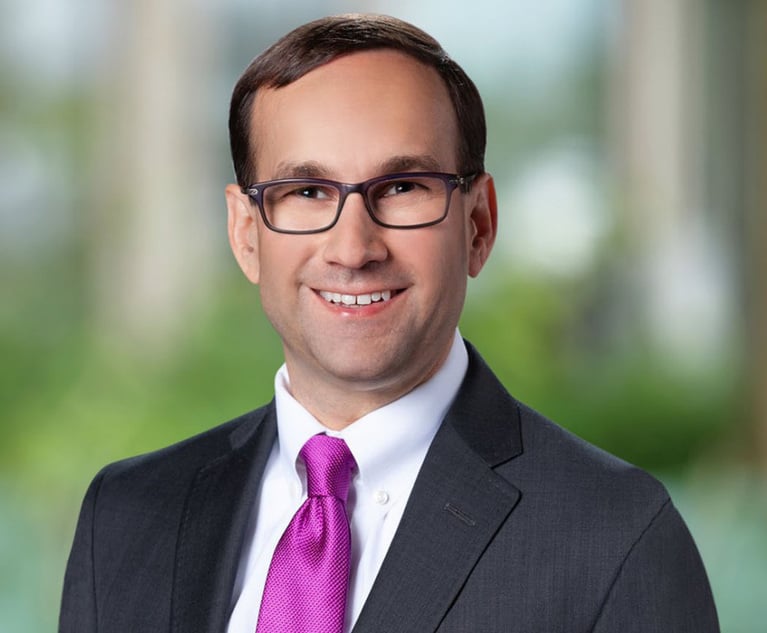Diversity, Succession Planning Played a Role in 2019 Fortune 500 GC Hiring
Gilmore, co-founder and managing partner at BarkerGilmore, spoke to Corporate Counsel about the firm's findings within Fortune 500 companies and what general counsel hopefuls should be doing to get hired.
January 23, 2020 at 03:32 PM
5 minute read
 John Gilmore, managing partner of BarkerGilmore. Photo: David Handschuh/ALM
John Gilmore, managing partner of BarkerGilmore. Photo: David Handschuh/ALM
Fortune 500 companies placed a greater focus on succession planning in 2019 for general counsel and are likely to continue that trend into 2020, according to research from the in-house search firm BarkerGilmore.
John Gilmore, co-founder and managing partner at BarkerGilmore based in Rochester, New York, spoke to Corporate Counsel on Thursday about the firm's findings in Fortune 500 companies and what general counsel hopefuls should be doing to get hired.
Corporate Counsel: Your research shows that the number of women general counsel hired by the Fortune 500 in 2019 made 33% of those general counsel women. Is this a sign these companies are taking diversity and inclusion more seriously?
John Gilmore: I think what is really showing that general counsel today are more mindful than they've ever been on succession planning. What they're doing is putting more women and minorities in these succession planning roles. What it's doing is increasing the odds that when it is time for the succession to kick in, the internal appointment is there and already has a relationship at the top. Being able to choose a woman or minority has become easier than it has been in the past.
By focusing on preparing them, such a high percentage of lawyers are being promoted from within as opposed to going outside.
CC: Has it been more typical of Fortune 500 companies in the past to get a top attorney from the outside?
JG: I don't have the exact percentages. Though the number of internal promotions has been higher than it has been in the past. I would say it is because GCs are doing a much better job of putting the No. 2s and 3s of their law department in front of the board of directors and forcing relationships and expanding their expertise.
Everyone has been preaching that this is what needs to be done. The good news here is that it is being done and it is paying off.
In all of the searches that we conducted last year, diversity was a priority. Unfortunately, we didn't get to the finish line every time with diversity. It becomes harder and harder as people gain more experience to relocate for some of these positions. We reach out to people who are perfectly qualified and tell us that they're not in the position to move.
They would like to take the opportunity, but they can't. So we get to the finish line and the non-diverse candidates for some of these searches were more able to move. Relocation is the No. 1 stumbling block.
CC: The data you provide shows that the average amount of time it takes for women to be internally promoted to general counsel is 14 years, and it is 13 years for men. Why do you think it takes that long?
JG: It takes time before the business knows them and respects them. It's all about everyone's level of confidence. It's not one of those things that happens overnight.
Those are the average numbers. Some of those people that were promoted from within were at their companies for 20 or 30 years before being promoted. You need to come in and make a commitment to these companies, and you need to be patient. Building your reputation for being a general counsel doesn't happen overnight. It depends on each individual [Fortune 500] company's succession plan.
CC: Forty-three percent of general counsel who came in from outside of a company had already been a general counsel. Is that largely what Fortune 500 companies are looking for when they hire from outside of their own legal departments?
JG: Most companies, when they come to us, say they would love someone who is sitting in a general counsel role today and already has that leadership expertise. That is ideal. In the end, that person can come from anywhere. Often, that person winds up coming from a law firm the company is working with.
It can come from a non-sitting general counsel. I wound up placing the No. 2s at two companies who had the board exposure and they were ready to go. These weren't junior lawyers who just weren't in a position to get the GC title for a number of years out and they didn't want to wait around.
There were also a few who had government experience who also had the specific regulatory experience that was most important to the reputational risk to the company.
When it comes to the finish line it is that person who has a connection with the CEO. It's one of those things that you know it when you see it.
CC: What kind of hiring trends do you think we'll see as 2020 progresses?
JG: It really is about someone who can communicate effectively and come up with solutions that no one else thought of. Also, make sure to take credit for that. Keep score on your own tally sheet of the different situations that you've been in where you've been able to think outside of the box, solve problems and take the company to another level.
They will be asking you about that in an interview, and the people that can speak the best about having a track record of doing so are the ones the CEO is going to be interested in.
This content has been archived. It is available through our partners, LexisNexis® and Bloomberg Law.
To view this content, please continue to their sites.
Not a Lexis Subscriber?
Subscribe Now
Not a Bloomberg Law Subscriber?
Subscribe Now
NOT FOR REPRINT
© 2025 ALM Global, LLC, All Rights Reserved. Request academic re-use from www.copyright.com. All other uses, submit a request to [email protected]. For more information visit Asset & Logo Licensing.
You Might Like
View All
From Reluctant Lawyer to Legal Trailblazer: Agiloft's GC on Redefining In-House Counsel With Innovation and Tech
7 minute read
People and Purpose: AbbVie's GC on Leading With Impact and Inspiring Change
7 minute read
From Olympic Aspirations to Legal Innovation: Tom Dunlop's Journey to Founding Summize
8 minute read
'Am I Spending Time in the Right Place?' SPX Technologies CLO Cherée Johnson on Living and Leading With Intent
9 minute readTrending Stories
- 1How Clean Is the Clean Slate Act?
- 2Florida Bar Sues Miami Attorney for Frivolous Lawsuits
- 3Donald Trump Serves Only De Facto and Not De Jure: A Status That Voids His Acts Usurping the Power of Congress or the Courts
- 4Georgia Hacker Pleads Guilty in SEC X Account Scam That Moved Markets
- 5Trump's Pick for SEC Chair Likely to Stymie Shareholder Proposals from ESG Advocates
Who Got The Work
J. Brugh Lower of Gibbons has entered an appearance for industrial equipment supplier Devco Corporation in a pending trademark infringement lawsuit. The suit, accusing the defendant of selling knock-off Graco products, was filed Dec. 18 in New Jersey District Court by Rivkin Radler on behalf of Graco Inc. and Graco Minnesota. The case, assigned to U.S. District Judge Zahid N. Quraishi, is 3:24-cv-11294, Graco Inc. et al v. Devco Corporation.
Who Got The Work
Rebecca Maller-Stein and Kent A. Yalowitz of Arnold & Porter Kaye Scholer have entered their appearances for Hanaco Venture Capital and its executives, Lior Prosor and David Frankel, in a pending securities lawsuit. The action, filed on Dec. 24 in New York Southern District Court by Zell, Aron & Co. on behalf of Goldeneye Advisors, accuses the defendants of negligently and fraudulently managing the plaintiff's $1 million investment. The case, assigned to U.S. District Judge Vernon S. Broderick, is 1:24-cv-09918, Goldeneye Advisors, LLC v. Hanaco Venture Capital, Ltd. et al.
Who Got The Work
Attorneys from A&O Shearman has stepped in as defense counsel for Toronto-Dominion Bank and other defendants in a pending securities class action. The suit, filed Dec. 11 in New York Southern District Court by Bleichmar Fonti & Auld, accuses the defendants of concealing the bank's 'pervasive' deficiencies in regards to its compliance with the Bank Secrecy Act and the quality of its anti-money laundering controls. The case, assigned to U.S. District Judge Arun Subramanian, is 1:24-cv-09445, Gonzalez v. The Toronto-Dominion Bank et al.
Who Got The Work
Crown Castle International, a Pennsylvania company providing shared communications infrastructure, has turned to Luke D. Wolf of Gordon Rees Scully Mansukhani to fend off a pending breach-of-contract lawsuit. The court action, filed Nov. 25 in Michigan Eastern District Court by Hooper Hathaway PC on behalf of The Town Residences LLC, accuses Crown Castle of failing to transfer approximately $30,000 in utility payments from T-Mobile in breach of a roof-top lease and assignment agreement. The case, assigned to U.S. District Judge Susan K. Declercq, is 2:24-cv-13131, The Town Residences LLC v. T-Mobile US, Inc. et al.
Who Got The Work
Wilfred P. Coronato and Daniel M. Schwartz of McCarter & English have stepped in as defense counsel to Electrolux Home Products Inc. in a pending product liability lawsuit. The court action, filed Nov. 26 in New York Eastern District Court by Poulos Lopiccolo PC and Nagel Rice LLP on behalf of David Stern, alleges that the defendant's refrigerators’ drawers and shelving repeatedly break and fall apart within months after purchase. The case, assigned to U.S. District Judge Joan M. Azrack, is 2:24-cv-08204, Stern v. Electrolux Home Products, Inc.
Featured Firms
Law Offices of Gary Martin Hays & Associates, P.C.
(470) 294-1674
Law Offices of Mark E. Salomone
(857) 444-6468
Smith & Hassler
(713) 739-1250






